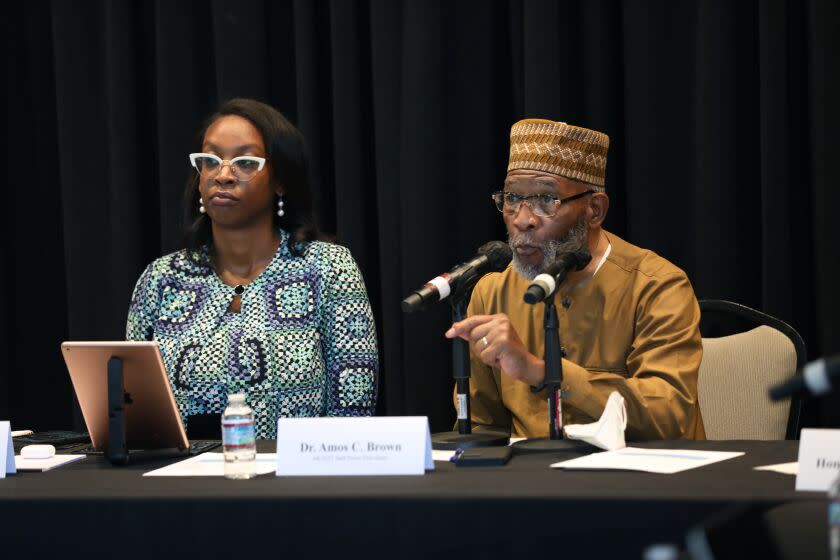California's slavery reparations plan: Eligibility, payments and other details

California’s Reparations Task Force on Thursday released its final report, marking a milestone in the state's historic effort to consider remedies for slavery.
The task force has spent the last two years hearing testimony from academics, economists and other experts to gather evidence of the effects of slavery and to prove the ways in which government sanctioned policies continued to discriminate against Black people long after slavery was abolished.
The movement now heads back to the state Capitol, where Gov. Gavin Newsom and the California Legislature is expected to begin considering the proposal next year.
Here is quick breakdown of the task force's recommendations for reparations from its report:
Read more: Is California giving reparations for slavery? Here's what you need to know
Eligibility
The task force voted to recommend "only those individuals who are able to demonstrate that they are the descendant of either an enslaved African American in the United States, or a free African American living in the United States prior to 1900, be eligible for monetary reparations."
In its compensation models, the task force cited population estimates from 2020 of less than 2 million non-Hispanic African American residents who lived in the state.
The task force recommended that the Legislature create a new California African American Freedmen Affairs Agency dedicated to implementing the task force’s recommendations and ensuring state agencies properly carry out any policies adopted into law. Among those duties could be helping people determine their eligibility. The agency should have a “genealogy branch to support potential reparations claimants by providing access to expert genealogical research to confirm reparations eligibility,” according to the final report.
Read more: Who should receive reparations in California for slavery? Answers raise more questions
Compensation:
The amounts each individual receives would be determined by the number of years they have resided in California for a minimum of six months of each year during a defined period of harm based on the laws and policies enacted at the time. The money would be given to every eligible recipient and no one would need to provide proof that they suffered direct harms. The task force also suggested the Legislature adopt an individual claims process to provide reparations for those who can prove particular harms.
The pay models suggest:
Compensation for health disparities: $13,619 for each year of residency from 1850 to 2020. This figure was derived by comparing life expectancy between Black non-Hispanic and white non-Hispanic Californians.
Compensation for mass incarceration and over-policing of African Americans: $2,352 for each year of residency in California during the war on drugs from 1971 to 2020.
Compensation for housing discrimination: $3,378 for each year between 1933 and 1977 spent as a resident of the state of California.
The proposal calls for additional compensation for unjust property takings by eminent domain and the devaluation of African American businesses, which the Legislature would quantify.
The task force recommended that the Legislature provide initial down payments to begin the process, with more payments to follow, and prioritize the elderly as the first in line for compensation.
Read more: California's reparations proposal moves to Newsom, state lawmakers
Policy change:
The task force also recommended changing existing law and adopting new polices to provide reparatory justice and ensure that the state does not repeat harms. Some of those recommendations include:
Repeal or amend Proposition 209, a measure approved by California voters that banned affirmative action in 1996.
Analyze laws, policies and ordinances from the local to the state level for racial impact prior to passage and after implementation.
Amend the California Constitution to prohibit involuntary servitude.
Pay fair market value for jail and prison labor.
Abolish the death penalty.
Fund community wellness centers in African American communities.
Strengthen the Bane Act by eliminating the requirement that a victim of police violence show that the officer “specifically intended” to commit misconduct.
Declare election day a paid state holiday.
Restore voting rights to all formerly and currently incarcerated people.
Implement rent caps for historically redlined ZIP Codes.
Increase grants and financial assistance to improve homeownership rates among African Americans, including subsidized down payments and mortgage payments to those who reside in formerly redlined neighborhoods.
Provide tax relief by allowing descendants who reside in formerly redlined neighborhoods to transfer the assessed value of their primary home to a newly purchased or constructed primary residence.
Provide free tuition to state public colleges for all California residents eligible for monetary reparations.
Build more parks in African American communities.
Identify and remove Confederate monuments, markers and memorials.
Create a guaranteed income program for descendants of an enslaved person.
Automatically increase minimum wage on a regular basis to adjust for increases to the cost of living, including inflation.
Provide interest-free loans to owners of small businesses in African American commercial areas.
End the cash bail system.
Repeal the “three strikes” law.
Adopt universal single-payer healthcare coverage and a healthcare cost control system.
Increase Medi-Cal reimbursement rates to match reimbursement rates of private insurance.
More coverage from The Times:
Column: For reparations, give Black Californians land in rural towns
Column: Future of reparations in California up to two L.A. Democrats
Question of reparations raises skepticism, hope in Black L.A.
Column: Why all Black people might not get reparations in California
Column: Newsom and California lawmakers need to say where they stand on reparations for slavery
Sign up for Essential California, your daily guide to news, views and life in the Golden State.
This story originally appeared in Los Angeles Times.

